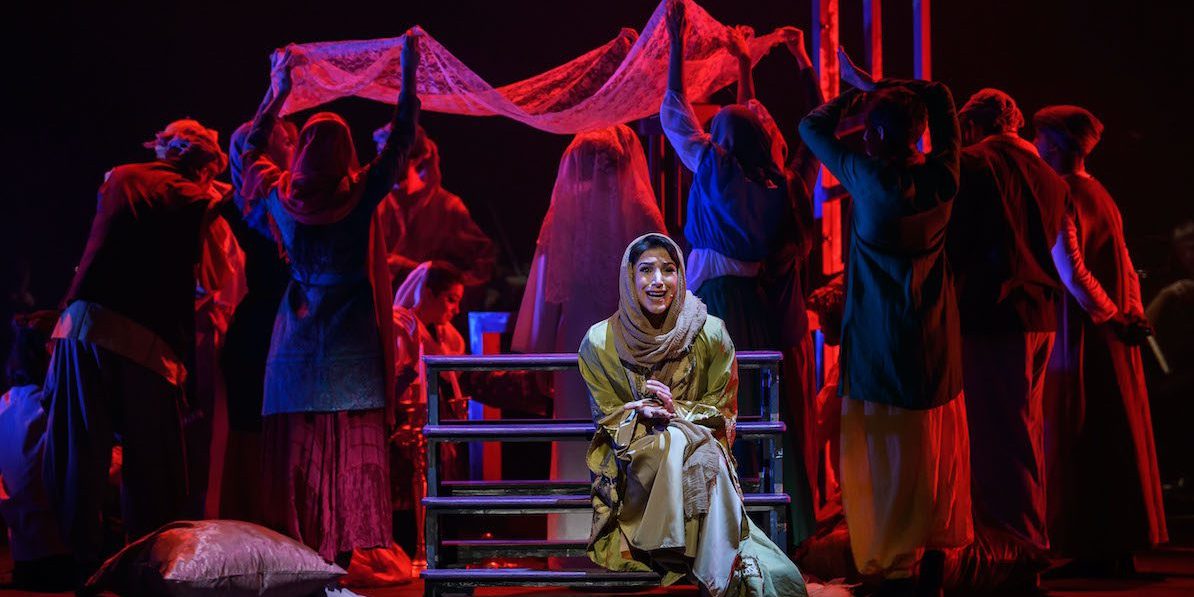For two nights the Coliseum has hosted a new musical by the team that brought ‘Broken Wings’ to London three years ago. Many of the points I made in my review of that musical also apply in this case. It is admirable that cultural and historical figures from the Middle East are now becoming regular subjects for full-length musical treatment. There are powerful narratives here which repay retelling, and there is great potential creative benefit to be derived from fusing the Western musical tradition with instruments and musical technique drawn from other backgrounds. But the plausibility of book and lyrics and variety of invention in the music need to be raised to a higher level – visual spectacle and a successful pre-existing concept album are not really enough to sustain dramatic tension and interest across what is a long evening.
What we see is a semi-staged dramatization of a key episode in the life of the 13th century mystic, philosopher and poet, Rumi, whose poetry has found a global audience and whose cultural presence still resonates in Afghanistan, Iranian and Turkish culture. The musical focuses on his relationship with a wandering Dervish, Shams, with whom he forms a mystical friendship, which maybe more than that, much to the chagrin and dismay of Rumi’s family and disciples in his home of Konya.
There are some strong lines of dramatic tension set up here which never quite develop as they should. All the lead singers have excellent voices and move naturally around the vast space that is the Coliseum’s stage, and no expense has been spared on the plush orchestral sound which offers a sumptuous swell of sound when needed together with more unexpected, characterful sounds and rhythms as a reminder of the Middle Eastern and Islamic core of the story. So there are no technical limitations to report. Nor is the minimalist staging a problem – a sequence of abstract vaguely Islamic arches, some sets of steps to provide different levels, and a few props to suggest interiors. This is enough together with a riot of colourful costume to hold your visual attention throughout.
The problems lie more with the lack of emotional and formal variety in the music and the ultimately flat characterisations of the leads. Much of the music is written in an expository ballad form with a blandness of lyric, emotional range and mood that simply palls after a while. One of the key points in any musical is the transition between words and song, impelled by the dramatic situation being played out. Here the lack of sustained dramatic pressure gives little sense of why or when words should end and song should begin. Ultimately, there is a surplus of benign cliché in words and music that cannot be hidden by the technical facility of the performers.
Behind this flaw lies a larger one of characterisation. Rumi, who should be the focus of the musical comes over as an awestruck disciple of Shams, who in turn remains something of an enigma. The main lead is simply too inexplicably passive. One ends up caring more for the aspirations and fears of the minor characters that the score and text delineate more sharply. Despite the ostensible focus on male bonding – of whatever kind – it is the women who linger longer in the memory: Casey Al-Shaqsy and Soophia Foroughi do an excellent job in articulating the frustrations that dominate their lives in a society controlled by men over whom they have little influence.
While this show promises much and delivers a visual treat, its overall impact is muted and thin, which is shame given the fascinating potential of its subject matter.

